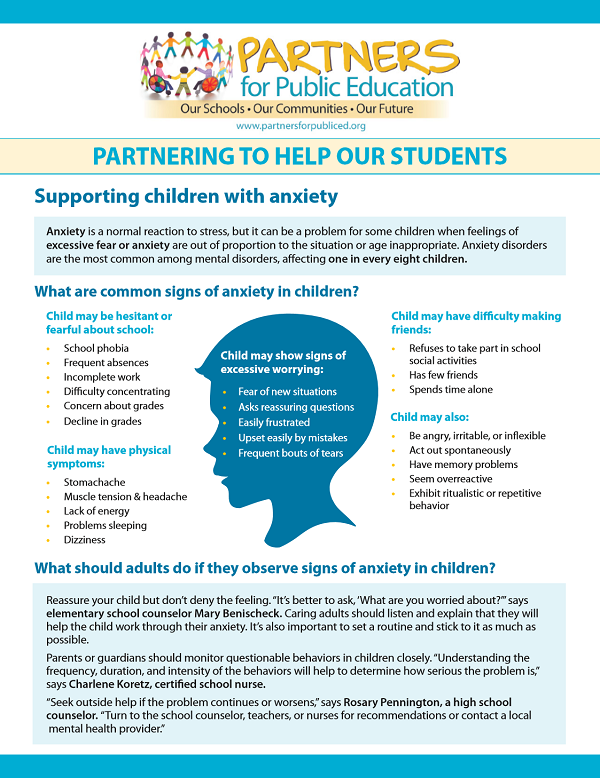Anxiety is a normal reaction to stress, but it can be a problem for some children when feelings of excessive fear or anxiety are out of proportion to the situation or inappropriate to their age. Anxiety disorders are the most common among mental disorders, affecting one in every eight children.

What are common signs of anxiety in children?
Child may be hesitant or fearful about school:
- School phobia
- Frequent absences
- Incomplete work
- Difficulty concentrating
- Concern about grades
- Decline in grades
Child may show signs of excessive worrying:
- Fear of new situations
- Asks reassuring questions
- Easily frustrated
- Upset easily by mistakes
- Frequent bouts of tears
Child may have difficulty making friends:
- Refuses to take part in school social activities
- Has few friends
- Spends time alone
Child may have physical symptoms:
- Stomachache
- Muscle tension & headache
- Lack of energy
- Problems sleeping
- Dizziness
Child may also:
- Be angry, irritable, or inflexible
- Act out spontaneously
- Have memory problems
- Seem overreactive
- Exhibit ritualistic or repetitive behavior
What should adults do if they observe signs of anxiety in children?
Reassure your child but don’t deny the feeling. “It’s better to ask, ‘What are you worried about?’” says elementary school counselor Mary Benischeck. Caring adults should listen and explain that they will help the child work through their anxiety. It’s also important to set a routine and stick to it as much as possible.
Parents or guardians should monitor questionable behaviors in children closely. “Understanding the frequency, duration, and intensity of the behaviors will help to determine how serious the problem is,” says Charlene Koretz, certified school nurse.
“Seek outside help if the problem continues or worsens,” says Rosary Pennington, a high school counselor. “Turn to the school counselor, teachers, or nurses for recommendations or contact a local mental health provider.”
Can life events increase a child’s risk of developing anxiety?
While anxiety is linked to genetics, experts say that life events can increase anxiety for children:
- Physical factors, such as puberty or illness
- Traumatic events, such as a death, an accident, bullying, or domestic abuse
- Environmental factors, such as moving and changing schools
- Familial changes, such as parental separation or divorce
- Socioeconomic factors, such as a lack of money for academic or health needs
What can schools do to help?
Public schools work closely with parents and families of students with anxiety. There are several professionals who can help, including school counselors, school nurses, school social workers, school psychologists, administrators, and teachers.
“School counselors can work with students on helpful techniques like positive self-talk, realistic thinking, and problem-solving. Counselors and teachers can help provide encouragement and accommodations for students during stressful situations.”
– Rosary Pennington, school counselor
“The school nurse may notice the frequency of student nurse visits for symptoms related to the anxiety that are manifested in physical symptoms, such as stomachaches, headaches, and difficulty breathing.”
– Charlene Koretz, school nurse
“As a school nurse, I can offer support in assisting students with their coping skills when anxious (deep breathing, relaxation techniques), providing a safe space for them, delivering their prescribed medication regime, assisting/supporting them in selfmanaging their condition…”
– Judith Morgitan, school nurse
“For me, I’ve had several students who just needed that friendly face at the door to give them a moment to get in the building. So, they might come in my office; we might have a little conversation.”
– Mary Benischeck, school counselor
Additional resources on anxiety coming soon.
Sign Up for Partners’ Emails
Get the latest news and information from Partners for Public Education.
Email address:
Paid for by PSEA